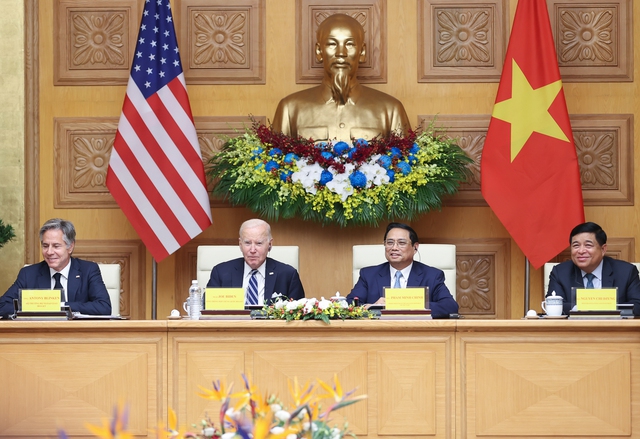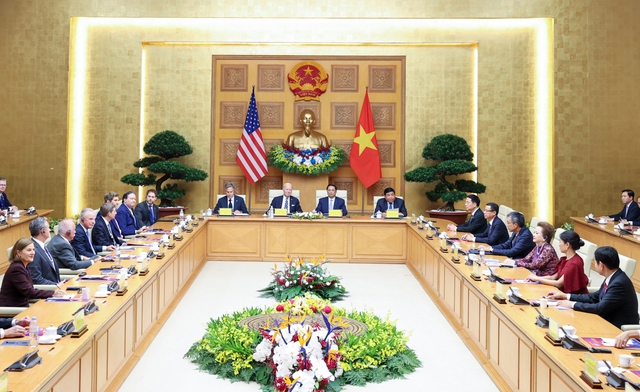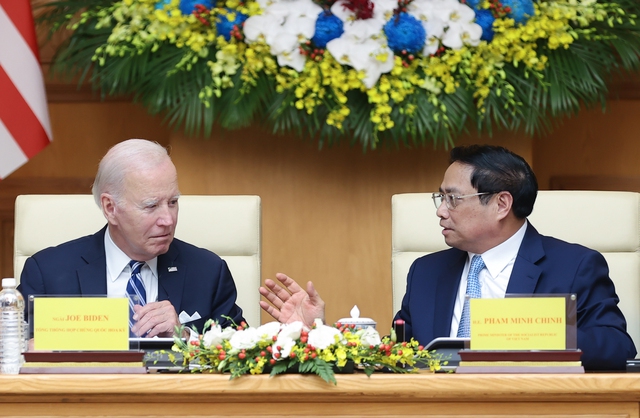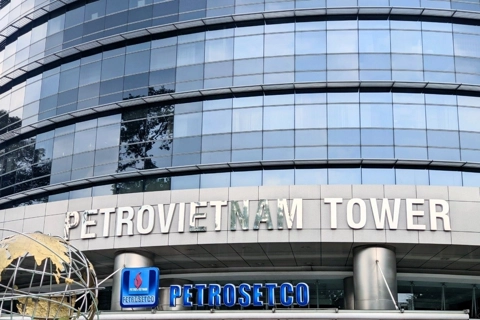Technology, innovation, investment - new pillars for Vietnam-US partnership
The US stands ready to collaborate with Vietnam in chip technology, semiconductors, innovation, green transition, and human resources development, with the latter's strong commitment to deeper engagement in global value chains.
Cooperation in technology, innovation, and investment would become new pillars of the Vietnam-US Comprehensive Strategic Partnership.
| Prime Minister Pham Minh Chinh and US President Joe Biden at the conference. Photos: Nhat Bac |
Prime Minister Pham Minh Chinh made the remarks at a Vietnam-US high-level conference on investment and innovation held in Hanoi today [September 11] with the participation of US President Joe Biden
A total of 14 Vietnamese and American companies attended the conference to discuss investment prospects in four key sectors: technology and innovation, manufacturing investment, financial services, fintech, and service trade.
During the conference, Prime Minister Pham Minh Chinh highlighted that one of the central objectives of President Biden's visit to Vietnam revolves around advancing Vietnam's economic growth, focusing on technology and innovation.
“Vietnam welcomes all investment partners, especially those from the US,” Chinh said.
He expressed the hope that companies from both nations would prioritize the allocation of resources for investment in areas such as science, technology, and innovation, especially digital transformation, the semiconductor industry, green growth, renewable energy, and efforts to combat climate change, including the promotion of a circular economy.
| Overview of the conference. |
President Joe Biden affirmed that the present moment offers a prime opportunity for the two countries to enhance their relations across various domains, including investments and innovations, to foster "shared prosperity." He conveyed the US's willingness to collaborate with and support Vietnam in chip technology, semiconductors, innovation, green transition, and human resource development. Of particular note is the commitment to deeper engagement in regional and global value chains.
US President Biden noted that “this is just the beginning” and suggested that Vietnam and the US need to strengthen and expand their cooperation for the future. Collaboration and partnership between the two nations should continue not only during good times but also in the face of difficulties and potential challenges, he added.
To capitalize on the opportunities for collaboration between Vietnamese and US enterprises, Minister of Planning and Investment Nguyen Chi Dung said that Vietnam has identified high technology, electronics, semiconductors, financial hubs, and innovation as key sectors. These areas present opportunities for domestic businesses to play a more substantial role in global value chains. They also provide an opening for US businesses to invest in Vietnam.
At the same time, Vietnam is actively developing its human resources and instituting preferential policies to advance digital transformation, renewable energy, the semiconductor industry, innovation hubs, and financial centers. These areas are characterized by high value-added and intense competition for joining global value chains, making them attractive to strategic investors, including US investors.
| The two leaders agree to ensure technology and innovation cooperation as a new pillar in bilateral relations. |
Dung suggested that US businesses continue to bolster their investments and expand their footprint in Vietnam, helping domestic enterprises integrate more deeply into the value chains. As an illustrative example, Dung said that as semiconductor giants such as Intel, Amkor, Marvell, Global Foundries, and the Semiconductor Industry Association (SIA) work together to develop chip and semiconductor ecosystems, they might also jointly establish a training and research center for chip and semiconductor product design in Vietnam. Additionally, Boeing made proposals to spearhead the development of a regional-scale component manufacturing ecosystem and an aircraft machinery and equipment maintenance center in Vietnam.
Meanwhile, Vietnamese enterprises are encouraged to actively pursue investments in the US while enhancing their capacity and financial resources to elevate their capabilities to effectively participate in the global value supply chain.
Dung noted that the Ministry of Planning and Investment is committed to providing continuous support and creating favorable conditions for US and Vietnamese businesses to make successful investments.
President Biden is on a state visit to Vietnam from September 10 -11. After the official welcoming ceremony, General Secretary Nguyen Phu Trong held talks with President Biden and announced the establishment of a Comprehensive Strategic Partnership between Vietnam and the US, with a focus on peace, cooperation, and sustainable development. Vietnam-US relations were normalized in July 1995 and upgraded to a comprehensive partnership in July 2013.
On September 10, the White House made public plans to strengthen collaboration with Vietnam across various domains, including investment in the innovation economy, science and technology, education and training, trade, investment, economics, climate, energy, environment, health, security, efforts to address the consequences of the war, and the promotion of business relations between the two countries.
Vietnam-US trade reached nearly $124 billion last year, marking a 275-fold increase over 27 years. The US is Vietnam's largest export market and second-largest trading partner. Conversely, Vietnam is the world's seventh-largest trading partner of the US and holds the distinction of being the largest trading partner within the ASEAN region.















